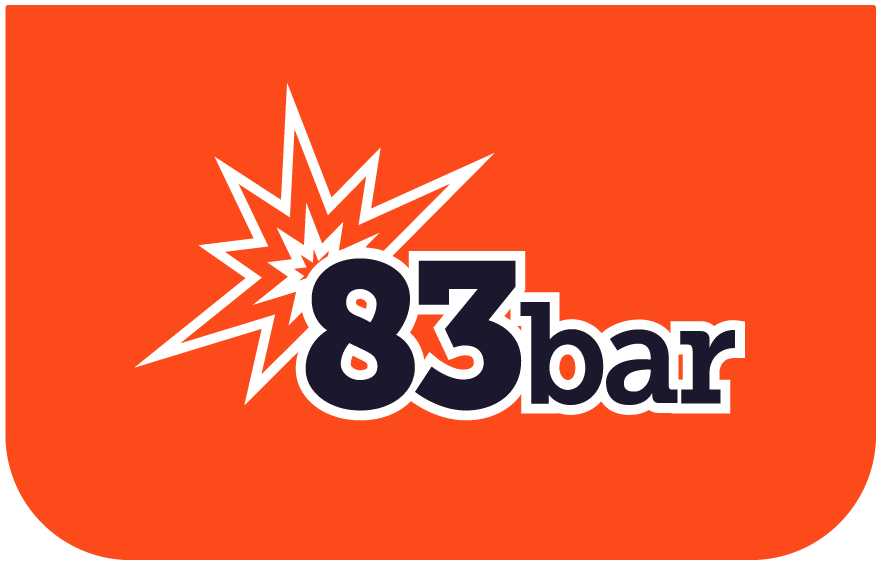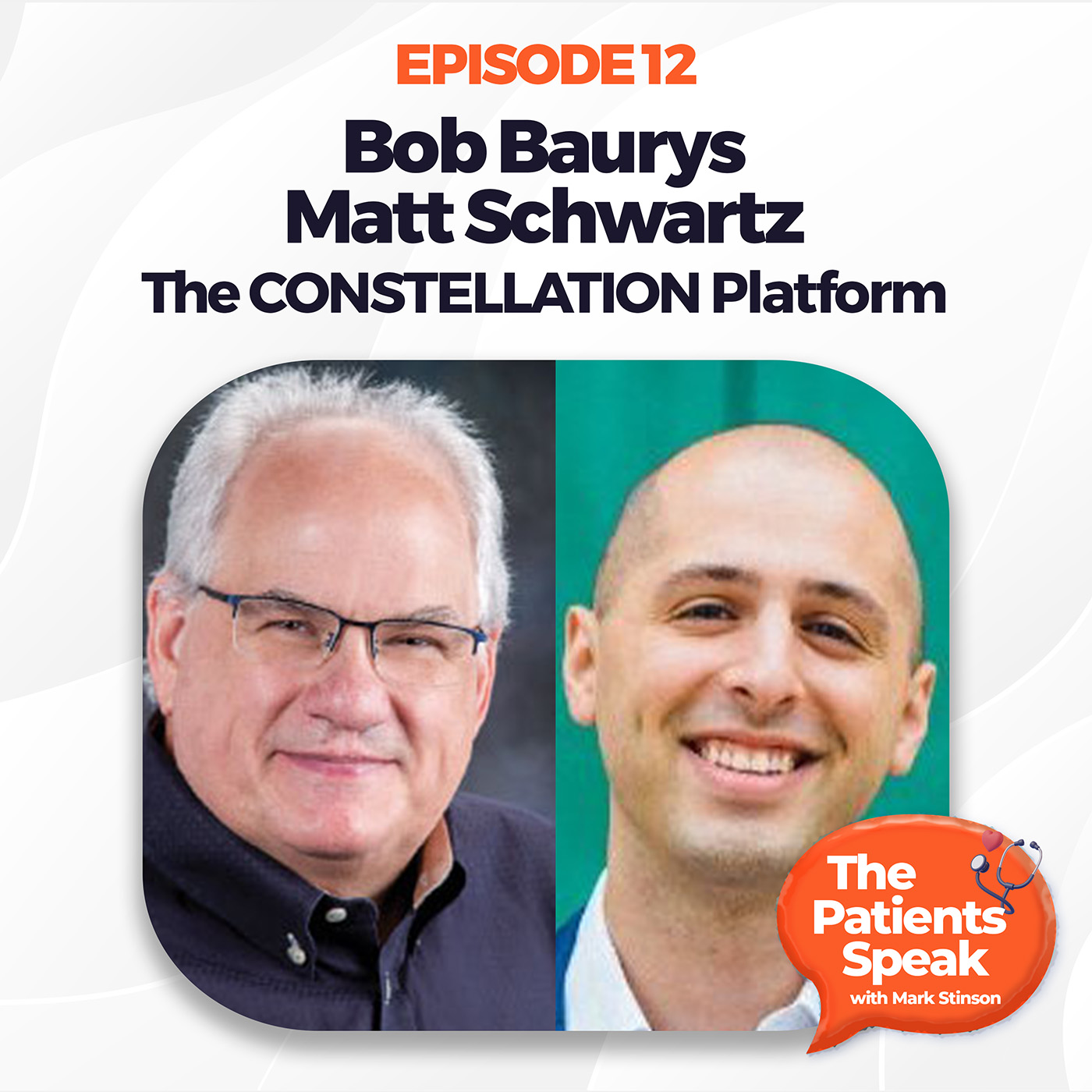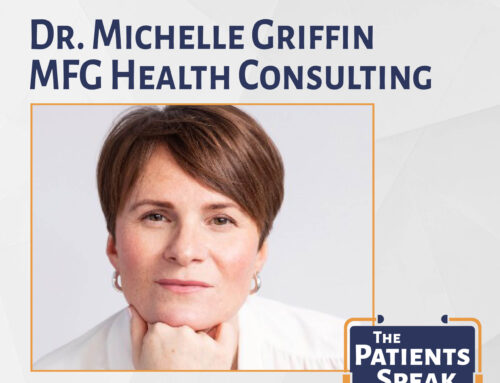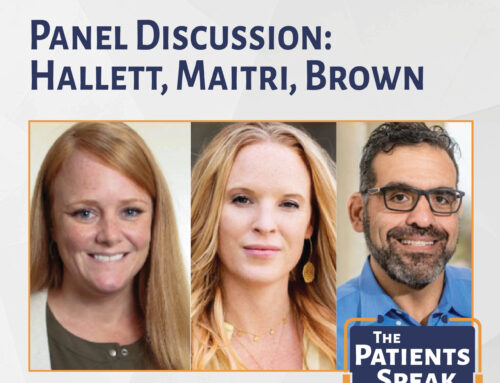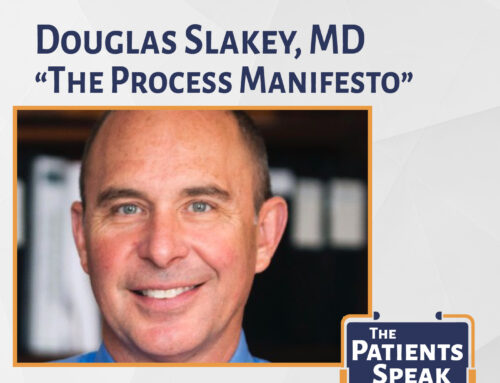Welcome back to our podcast, The Patients Speak, where we’re combining the business and science innovations of healthcare with the patient voice and how to help them navigate the complicated healthcare system to get from diagnosis to wellness faster and more smoothly.
Today we have two great guests and some interesting and timely information about how to accelerate the enrollment and recruitment of patients in clinical trials. We have Bob Baurys, the CEO of 83bar, and Matt Schwartz, the CEO and co-founder of Virgo.
We are excited to talk to both Matt and Bob about the announcement of their companies’ collaboration called The CONSTELLATION Platform.
Mark Stinson, host:
Hello everyone and welcome back to our podcast, The Patients Speak, where we’re combining the business and science innovations of healthcare with the patient voice and how to help them navigate the system to get to from diagnosis to wellness faster and more smoothly, and navigate the complicated healthcare system. Today we have two great guests and some interesting and timely information about how to accelerate the enrollment and recruitment of patients in clinical trials. We have Bob Baurys, the CEO of 83bar, and Matt Schwartz, the CEO and co-founder of Virgo. Bob. Matt, welcome to the program.
Bob Baurys, 83bar:
Thank you.
Matt Schwartz, Virgo:
Yeah, thanks for having us.
Mark Stinson, host:
Yeah. Well, and I’m looking forward to the announcement of a collaboration your two companies are going to be doing. But Bob, maybe we could start with you. At 83bar, you’re sponsoring, you’re helping present this podcast about patient voice. Why is it so important to you and the mission of your company that we listen when the patients speak?
Bob Baurys, 83bar:
Well, I think we’ve all sort of lived through the evolution of patients and self education. If you think back 15 or 20 years ago, it was pretty traditional to have a family doctor and to be able to have someone as that family doctor would provide guidance. As the evolution of the internet has involved and the evolution of patients taking care of their own healthcare, many patients, started to self-educate and the advent of urgent care started to replace the traditional family doctor.
So what we found and we thought we could really help the marketplace was their patients were in the market on the internet trying to find information about something they were researching for their own healthcare. But oftentimes it was a gathering and a mixture of curated, uncurated, sometimes true, sometimes not true information. And we at 83bar said that if we can make a contribution to society, it would be engaging those patients who were sort of doing self-education with the process that would enable them to understand what’s true, what’s not true, what’s valid, and enable them to walk through a decision process and then figure out where and when to engage the healthcare system, so that they have maximum efficiency.
So that’s the model and that’s where we sit in the marketplace and we try to really help patients at that early self-discovery phase.
Mark Stinson, host:
Wow, very interesting. And thanks again for presenting this podcast. Matt, maybe we can turn to you and Virgo and what is really titled Surgical Video Solutions, but there’s a real technology platform behind your company. I’d love to hear more about it.
Matt Schwartz, Virgo:
Yeah, sure thing. So we started Virgo back in 2017 with a mission to improve patient outcomes and clinical workflows in healthcare by developing automation and AI tools for endoscopy. And endoscopy, it’s a huge part of the healthcare ecosystem. It’s oftentimes many patients’ first kind of interaction with the healthcare system in their journey, whether it’s a colonoscopy or an upper endoscopy, either for screening purposes or because they’re dealing with some sort of ailment. And when we started the company, we recognized that the documentation for endoscopy was fairly lacking. These are video-based procedures. The doctor places a small camera inside the patient to make a diagnosis or apply a therapeutic, but the video from these procedures that the doctor would watch in real time would just disappear after the procedure was done. And we felt like there was a huge opportunity to help create an easy to use solution for doctors to capture these videos and use them for all sorts of purposes.
And so now today we provide the leading cloud video capture management and AI analysis platform for endoscopy. We’ve got a small device that you can maybe see in my screen here, similar in form factor to an Apple TV. It’s very easy to install and we connect this to any existing endoscopy system that a physician may be using. And then the device uses machine learning to automatically start and stop video capture. So the doctors, the clinical team, they don’t have to change anything about what they do. The procedures just automatically get recorded and securely transferred to our HIPAA compliant web portal.
And a big reason why we started this is, as potential patients ourselves and speaking with patients, we found that people were generally fairly amazed that this really information rich data wasn’t being captured already. I think if you talk to most patients, they assume that the video from their colonoscopy is being saved somewhere. And we felt like we could make it very easy to make this a scalable solution and help all endoscopy videos get captured. We’ve been quite successful in doing that and have built up a great user base here in the US and are starting to expand internationally. We’ve now helped leading medical centers across the country capture over 500,000 endoscopic procedure videos. And that number continues to grow rapidly.
And in doing so, we’ve also uncovered these different opportunities for what can be done with this endoscopy data. And a big part of that has led us to the relationship with 83bar and being able to leverage this endoscopic data network to accelerate patient recruitment for clinical trials. So we’re really excited about that and being able to provide great solutions for physicians is a huge part of what we do, but we also love always being able to tie it back to the impact it has on the patient journey as well.
Mark Stinson, host:
Well, we want to continue to talk about that, but maybe Bob, we bring you back in here to say what does 83bar do? How does it work? And maybe then how does it plug in to what Matt was talking about?
Bob Baurys, 83bar:
Sure. So 83bar is a fully integrated patient activation platform. So what does that mean? So what we do is we reach into the marketplace and you’ll often see, sometimes you’ll see, some ads on Facebook or Google and it might be something like an overactive bladder ad and where maybe you’re searching around and you’re trying to find a solution for that issue, that personal issue. And what we do is we will gather the information, we’ll have an engagement with you where we’ll gather information, and then we’ll have one of our nurses actually contact you, walk you through the answers that you’ve just given us on an online survey. And then ultimately give you more education about what overactive bladder does, how it works, and then also walk you through what some of the solutions on the marketplace are and then what you may or may not qualify for.
And then if you decide, if you as a patient, decide you want to move forward, we can oftentimes concierge you into an appointment where you might get priority scheduling or we’ll be able to walk you through into a specialist who can take care of that for you. So it’s an end to end. Not only do we help you gather information, we help you understand what’s valid, but we also walk you through right into the point of activation, which is where you now have the confidence and the information and you make a decision to do something. And we enable that decision to become reality. So if you think about 83bar, that’s the whole continuum.
In terms of patients who were going through the Virgo system and who identify as needing potentially intervention, whether that’s on a commercial site or a clinical research site, we would act as your personal concierge nurse and we would actually, once you’re identified, we would actually walk you through all of the options that you have and then help you understand what’s best for you. And then when you make the decision, you as the patient make the decision, what we’ll do is we’ll actually help you enable that decision and help you with the enrollment or the referral as needed. So, I think the key thing is how do you tie technology to humans and how do you make technology work with empathy? And that’s the real combination of two companies like this.
Mark Stinson, host:
Well, great. Well, Matt, you saw a synergy certainly in the way you guys both described this. It does seem to fit and plug in together quite well. What’s the nature of this joint venture that you’ve created?
Matt Schwartz, Virgo:
Yeah, I think Bob described it really well. We were incredibly impressed when we first met the 83bar team by their capabilities and solutions they’ve developed to really intelligently and empathetically help patients navigate through the clinical research journey. Oftentimes patients show up, it can be daunting for them to get through and just get themselves enrolled into a clinical research opportunity that they might qualify for. And from our perspective, we’ve kind of been attacking the problem from the other side, where for certain trials there are all these specialized requirements and we’ve had a lot of focus on inflammatory bowel disease as well as other gastrointestinal clinical studies where patients have to meet very specific criteria in order to just be eligible to enroll in a study.
And identifying the right patients at clinical sites can be really challenging. You have to know a lot about all the different studies that are available within your health system. And so it puts a lot of burden on the principal investigator and clinical research coordinators to be evaluating their patients in real time. And it’s also hard for them to see the holistic view across their entire health system where there may be patients being seen out in the community who would be good candidates for a trial that they just never hear of. And so with our technology, we recognize that the endoscopic video from a patient’s colonoscopy or upper endoscopy, can be really enlightening for finding the right patients for the right type of trial. And we actually do that again with artificial intelligence. So instead of having a human review every single video, we have artificial intelligence that analyzes each video and selectively flags patients that we think may be good candidates for very specific types of trials.
We think this is kind of like finding the needle in the haystack. If you’ve got a large health system with kind of a primary academic hospital, a number of community hospitals and outpatient endoscopy centers, we start by capturing the endoscopy data on the entire patient population within that health system. And then we use the AI to automatically surface those needles in the haystack. And what we found is that this does an amazing job of finding really high quality patient referral candidates, who we can then put in front of the clinical research coordination team and the principal investigator. But that’s only step one in the process.
You found these great patients, now you have to actually navigate the patients through the enrollment process. And there’s just a lot of burden on the clinical research coordinators and principal investigators, who are already busy treating patients, actually administering clinical trials. And so what we found is that there’s a bit of a gap still in taking a great referral and helping explain to them the research opportunity that’s in front of them, what that research means, and actually navigating them through enrollment into the trial itself.
And so that’s why we’re so excited to partner with 83bar on the Constellation Platform. We think it puts together the best of both worlds where we can surface incredibly high quality pre-screened patient candidates and work within the 83bar platform to get those patients properly navigated and enrolled into clinical trials.
Mark Stinson, host:
And Bob, Matt you mentioned this name, the Constellation Platform. There’s certainly the imagery of stars connecting and stars aligning. Is this where the clinical contact center that you have, begins to connect those dots?
Bob Baurys, 83bar:
Sure. I mean, it’s the whole pathway. So just because you identify someone and they now know they have an issue and they want to do something about it, what’s my next step? And so it’s a complicated process through the US healthcare system. It always is, and it’s really, it’s daunting for most people. So the idea is, is that you have a lot of different pathways you can go on. You really need someone to be your Sherpa, your guide, and to walk you through that pathway. And that’s where our clinical contact center comes in with registered nurses who will walk you through, educate you, and then really ask you what you want to do. Our goal is to get you to the level of confidence that you say, “I want to do something.” And then for us to facilitate that. So our education basis is to make you feel empowered and confident, and when you make a decision, then it’s for us to help you enable that.
Mark Stinson, host:
Sure. Well, Bob, Matt also showed us, I mean literally a black box. But AI supported, AI enabled and technology enabled platform. And yet describing this idea of empathy. How do patients understand, “We took a video during your endoscopy. We believe you meet these inclusion criteria.” How is that conversation from a technology and empathy standpoint?
Matt Schwartz, Virgo:
I think historically or traditionally, that conversation is pretty lacking, frankly. It’s just not a part of the conversation. And that’s what we’re looking to change here is, we think we’ve got the technology to surface the relevant information, but we feel it’s absolutely critical to get a human in the loop to connect all of those dots and have someone that can actually credibly explain to a patient what a specific trial means and give them the attention to detail that they need to make them feel comfortable with the clinical trial.
One of the things we see, even in just standard clinical care with the Virgo platform, there are doctors using Virgo who will actually show patients in recovery, highlights of their video from a colonoscopy, for example. And what we hear from those physicians is that the patients just absolutely light up when they can see what’s taking place during their procedure. They’re under anesthesia during colonoscopy. And so for a doctor to be able to explain to them after the fact, “Here’s what I saw. Here’s what I did. Here are the next steps,” with a really compelling visual aid in the video, can be incredibly powerful.
And what we think we’re going to be able to bring through the Constellation Platform is that level of guidance and education with patients through a clinical trial as well. When you have these complex trials in inflammatory bowel disease, for example, not only is it difficult to find the patients to enroll the study, actually it can be difficult to maintain those patients over the course of the study and prevent them from dropping out. Oftentimes a patient may show up for a clinical study, they receive the initial treatment, and maybe they start to feel better and they think, “I don’t need to show up for my follow up visits.” While it’s great that they feel better, that can be really detrimental to a clinical study if you’re losing these patients to follow up.
And so beyond just connecting the dots for finding these patients and getting them enrolled initially, we think it could be really beneficial to maintain that connection with the patients and keep them engaged and active in the clinical trial over the course of the study. And maybe that looks something like for their six month check in colonoscopy, there’s a registered nurse navigator that explains to them, again, “Here’s what was seen during your colonoscopy. Here’s how your treatment is progressing. And here’s next in the clinical trial and why it’s so important for you to keep coming back for the follow up visits.”
Mark Stinson, host:
And Bob, you’re no beginner to talking to pharmas and medical device manufacturers about their clinical trials. So they know or they hear, many promises of accelerating recruitment, accelerating the trial. Bob, what would you say to some of these clinical directors, medical directors, sponsors of the trials, about is Constellation different? How could it really accelerate the recruitment?
Bob Baurys, 83bar:
Well, I think it’s further down in refinement. I think most of clinical trial recruitment comes from a wide net being cast and trying to find patients who fit the particular inclusion/exclusion data. And by that, forcing it to be a large end number of patients you have to talk to, to get to your net number that need to be in a trial. Through the process of the Virgo platform, what you’ve done is, you could tighten that net from a very wide net to a very specific audience who clearly has the indication and who clearly has the need for the next step. So it’s an efficiency model. Why talk to 1,000 people when I could talk to 40 people who I know those 40 people have that specific need at that point in time and are highly qualified? And then just provide an extraordinary level of comfort, concierge, and support around that journey to make it work for both the sponsors, the pharmaceutical companies, and the patient. It’s an optimum sort of solution for everyone involved.
Mark Stinson, host:
Good to know. Well, where can we go and learn more about Constellation and connect and make sure we bring people together with you?
Matt Schwartz, Virgo:
Yeah, we’ve got a great landing page with more information about the Constellation Platform. It’s just at www.constellationplatform.com. There’s contact links there as well. If you’re a patient, a clinical trial sponsor interested in learning more, we’d love to hear from you. We’re incredibly excited about Constellation and what this is going to bring to the patient journey for clinical trials.
Mark Stinson, host:
Fantastic. Well, Matt, maybe we could land on the patient and that empathy side you were talking about. If you scroll down on your resume, your LinkedIn profile, you were brought up in industrial design and engineering, product management and all sorts of devices. Where did you begin to gain this empathy and a real listening and a connection to the patient voice rather than just the technology?
Matt Schwartz, Virgo:
I guess you don’t get to choose who your parents are, but I definitely got very lucky in that regard. And it honestly started with my dad. He’s a spine surgeon and he was going through residency when I was born. And so from my earliest memories, my dad was treating patients and he kind of sub specializes in doing a lot of pediatric scoliosis work. And over the course of my life, he would drag us with him to the hospital on the weekend when he had to make rounds. And so I was seeing him interact with patients on a very regular basis. And I don’t know, I’ve met a lot of doctors in my days. I’m obviously biased, but I think my dad’s got probably the best bedside manner of any physician I’ve ever interacted with. And it definitely made its mark on me.
And so when I was choosing a career pathway, got very interested in medical technology and studied biomedical engineering, but I think that was always imprinted early on, is that healthcare is ultimately about patients at the end of the day. We build tools and oftentimes our tools are meant for physicians or clinical researchers or nurses as the primary end user, but in everything we do, it’s really important to understand that those end users are actually using our tools as part of the patient care continuum. I think that’s got to be the genesis, if I look back over the course of my life, that’s got to be where it came from.
Mark Stinson, host:
Yeah, that’s good background. And Bob, leave us with what I might call a call to action. If we were in a meeting today, thinking about clinical trial recruitment and obviously the application of this Constellation Platform, but what would you advise we as recruiters, as sponsors, maybe the ClinOps people at the companies, what could we do to better listen to the patients?
Bob Baurys, 83bar:
I think, think differently. Think differently than the patient, as less of as a commodity and more of an individual who’s struggling and trying to figure out what’s best and continue to provide more resources for patients to self-educate and walk themselves to find the solution that you may have. Oftentimes, we may be working on the next greatest solution or the next greatest healthcare breakthrough in the world, but patients won’t find it and won’t, especially patients who are on the self education pathway, they’re going to need the tools and they’re going to need the clear pathway markers, to be able to understand what you’re doing, to figure out how they engage you. There’s no master puppeteer family doctor who’s calling all the shots for 90% of the population anymore. That doesn’t exist. So you have to think about the doctor doing a referral at some point, but the reality of it is the bulk of your patients are now going to come through a self-educated, self-directed pathway.
Mark Stinson, host:
Good insight. Well, Matt, Bob, can’t thank you enough for being on the program, sharing your experience and your insights.
Bob Baurys, 83bar:
Thank you. Enjoyed it.
Matt Schwartz, Virgo:
Thanks so much for having us.
Mark Stinson, host:
Well, and congratulations on this Constellation Platform and I’m sure it’s going to get a lot of attention and wish you luck with it.
Bob Baurys, 83bar:
Thank you.
Matt Schwartz, Virgo:
Appreciate that.
Mark Stinson, host:
Well listeners come back again for our next episode. We’re going to continue to talk to companies who are innovating solutions for patients, but we’ll also be talking to medical providers, patient advocates, about how we can better listen to the patients. And that’s what it’s really all about. So won’t you join us again to listen to The Patients Speak. And thanks to 83bar for sponsoring our program. We’ll see you next time.
